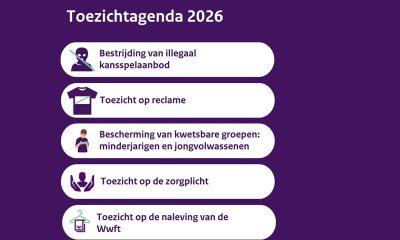Asia
EGT to Present its Innovative Solutions at SIGMA Asia 2023

EGT is ready to captivate the visitors of SIGMA Asia 2023. It is going to be the first participation of the Bulgarian manufacturer in the event, which will take place in Manila this year. The company’s innovative solutions will be on display on stand D19.
Along with the absolute bestseller Bell Link, which gained great popularity in multiple markets around the world, the 4-level Asian-themed jackpot Cai Fu Tian Jiang will be among the top proposals for the local gaming audience. Its 4 games Animal Riches, Expanded Riches, Incredible Lantern and Pearls of Wealth will dive the seekers of vast wealth into the magic of the Far East and will inspire them to continue their exciting journey full of numerous opportunities of winning and entertainment. Both jackpots will be housed in the G 50 J2 St and G 27-27 Up slot cabinets, which already are among the most preferred models of the General Series.
The multiplayer portfolio of the company will be presented by its latest additions: the G 32 T and G 27 T terminals and the roulette G RSA. All of them feature eye-catching design, a lot of ergonomic features and great flexibility, allowing many possible configurations with other devices. They will be equipped with the top performing jackpot Jackpot Cards, as well as Green and Blue Power multigames, each one containing more than 50 of the most popular titles of EGT.
The diversity of gaming products will be complemented with the cutting-edge iGaming solutions of EGT’s subsidiary EGT Digital.
“We are very excited that we will make a debut at SIGMA Asia. Our products have huge potential for local markets and the exhibition gives us an excellent opportunity to present them both to our current partners and to a large number of potential new customers. We can’t wait to welcome all of them on stand D19 on July 20 and 21,” Mariana Manchina, sales manager for the Philippines at EGT, said.
Asia
World Esports Summit Celebrates Its 10th Edition in Busan

The World Esports Summit returns to Busan, South Korea, for its 10th edition, taking place on 10–11 February 2025.
Hosted at the Wyndham Grand Busan, the Summit will bring together 40+ speakers from the international esports ecosystem, including representatives from federations, publishers, global brands, sports organizations, technology companies, and public institutions.
Over the past decade, the World Esports Summit has provided a platform for dialogue and cooperation among stakeholders shaping the world of esports. The 2025 edition will continue this role, offering space for discussion on current developments, industry challenges, and future directions.
The Summit will feature contributions from a wide range of organizations, including Alibaba, FIBA, FIFAe, Tencent, Moonton, NetEase, FIA, Sportradar, EFG, Good Game, Telekom, among others.
Across two days, participants will take part in keynote sessions and panel discussions addressing topics such as esports governance, international collaboration, industry development, integrity, and the continued convergence of esports and traditional sports.
Further information on the program, speakers, and registration is available on the official World Esports Summit website.
The post World Esports Summit Celebrates Its 10th Edition in Busan appeared first on Eastern European Gaming | Global iGaming & Tech Intelligence Hub.
Asia
Insurgence Gaming Company Expands Grassroots Vision with MOBA Legends 5v5 Discord Play-Ins

Following the launch of its inaugural women-focused VALORANT tournament La Imperia, the Insurgence Gaming Company has announced its second competitive initiative, MOBA Legends 5v5 Discord Play-Ins, a series of open community tournaments created to make organised competition more accessible to emerging players.
While La Imperia introduced a visibility-led invitational format, the MOBA Legends 5v5 Discord Play-Ins take a different approach. The series is built around open participation and will be hosted entirely online, with all tournament operations managed through Discord. This allows teams from across India to compete in a structured setting without the restrictions often associated with invite-only events.
The Play-Ins are designed as a starting point for players and teams who want to experience organised competition. Matches will be played in a 5v5 MOBA Draft Pick format, with scheduling, match reporting, and communication handled through dedicated Discord channels.
The announcement continues Insurgence Gaming Company’s early focus on grassroots esports. The company was created to address gaps in India’s competitive ecosystem, particularly at the amateur and semi-professional level where consistent tournament opportunities are still limited.
Speaking on the launch, Jasper Shabin, Founder of the Insurgence Gaming Company, said: “With La Imperia, we focused on visibility. With the Discord Play-Ins, the focus shifts to access. Competitive players need regular places to play, improve, and test themselves, not just one-off tournaments. MOBA Legends 5v5 is one of the most accessible competitive titles on mobile, which makes it a strong fit for an open, community-driven format.”
Beyond competition, the Discord Play-Ins are also intended to build a sense of continuity. Players will have access to channels dedicated to match coordination, tournament updates, and post-game discussion, helping teams stay connected beyond a single tournament run.
With the MOBA Legends 5v5 Discord Play-Ins, the Insurgence Gaming Company continues to shape its identity around community-first formats, pairing visibility-led initiatives like La Imperia with open competitive pathways that support long-term grassroots growth in Indian esports.
The post Insurgence Gaming Company Expands Grassroots Vision with MOBA Legends 5v5 Discord Play-Ins appeared first on Eastern European Gaming | Global iGaming & Tech Intelligence Hub.
ALGS 2026 Championship
S8UL Esports secures historic top five finish at ALGS 2026 Championship; bags INR 1 crore in prize money

S8UL Esports, a global powerhouse in esports and gaming content, delivered a landmark performance by finishing among the top five teams globally at the Apex Legends Global Series (ALGS) 2026 Championship, held in Sapporo, Japan from January 15 to 18. This result represents the best ever finish by an Indian organization on the Apex Legends global stage, setting a new benchmark for Indian esports at the highest level of international competition.
The ALGS 2026 Championship, the crowning event of the Apex Legends competitive calendar, brought together 40 of the world’s most consistent and high-performing teams from the year-long global circuit. S8UL’s all-Australian roster featuring Rick Wirth (Sharky), Benjamin Spaseski (Jesko), and Tom Canty (Legacy), led by head coach Harrison Rogers (Rogers), delivered a standout campaign and emerged as the only South Asian team to secure a Top 5 finish at the premier international Apex Legends event. The team earned USD 120,000 (approximately INR 1 crore) from the tournament’s USD 2,000,000 (approximately INR 18.14 crore) total prize pool.
Commenting on the achievement, Animesh Agarwal, Co-founder and CEO, S8UL, said, “Over the years, we have built one of India’s strongest gaming creator ecosystems and a solid foundation in content. In the last 18 months, we have deliberately expanded our focus to global esports investments across multiple titles, and performances like this validate that vision. Our ambition is to compete and win at the highest level worldwide. We are investing deeply, assembling world-class international rosters, and representing S8UL on the global stage from India. A top five finish at ALGS is a major milestone, and it marks only the beginning of what we believe will be a very strong future for S8UL in esports.”
S8UL began their campaign in Group B, navigating a demanding round-robin stage where all 40 teams were divided into four groups of 10. The team’s consistent performances saw them finish among the top 20 teams, earning a spot in the Winners Bracket and keeping them firmly in title contention.
From there, S8UL qualified for the Grand Finals, where the remaining 20 teams competed under the high-pressure Match Point Format. Under this system, a team must reach 50 points and then secure a match win to claim the championship, with the remaining teams ranked by total points. Across nine final matches, S8UL accumulated 64 points to finish fifth overall, just one point behind fourth-placed GROW Gaming, underlining how closely contested the championship was.
“The margins at this level are extremely fine, and the team showed tremendous composure throughout the tournament. From the group stage through to the finals, the players displayed adaptability, trust, and resilience. Finishing in the top five globally is a major milestone, and it reinforces our confidence in this roster’s ability to contend for championships in the future,” commented Harrison Rogers, coach of S8UL’s Apex Legends team.
S8UL’s performance at the ALGS 2026 Championship builds on the organisation’s growing presence in international Apex Legends competition. In 2025, S8UL competed at the ALGS Midseason Playoffs as part of the Esports World Cup in Riyadh, where the organisation also became the first Indian team to be selected as a Club Partner for the tournament. With consecutive appearances at Apex Legends’ premier global events, S8UL continues to establish itself as a consistent contender on the world stage and a flagbearer for Indian esports internationally.
The post S8UL Esports secures historic top five finish at ALGS 2026 Championship; bags INR 1 crore in prize money appeared first on Eastern European Gaming | Global iGaming & Tech Intelligence Hub.
-
Latest News6 days ago
N1 Partners Hosts the N1 Puzzle Promo Grand Final and Reveals the Helicopter Winner at iGB Affiliate 2026 in Barcelona
-

 Games Global6 days ago
Games Global6 days agoGames Global and Stormcraft Studios extend the supernatural franchise with Immortal Romance: Sarah’s Secret Power Combo
-

 Amusnet6 days ago
Amusnet6 days agoWeek 4/2026 slot games releases
-

 ADG7 days ago
ADG7 days agoArizona Department of Gaming Names Juan Carlos Estrada as Boxing and Mixed Martial Arts Executive Director
-

 AFCON 20257 days ago
AFCON 20257 days agoAFCON’s month of football did not lift iGaming demand — Blask data analysis
-

 Asia6 days ago
Asia6 days agoWorld Esports Summit Celebrates Its 10th Edition in Busan
-

 affiliate marketing6 days ago
affiliate marketing6 days agoN1 Partners Hosts the N1 Puzzle Promo Grand Final and Reveals the Helicopter Winner at iGB Affiliate 2026 in Barcelona
-

 Compliance Updates6 days ago
Compliance Updates6 days agoDutch Regulator Outlines 5 Key Supervisory Priorities for 2026 Agenda



























